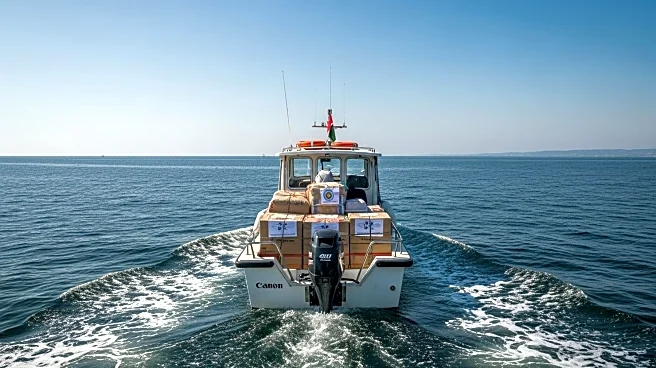What's Happening?
A flotilla of ships departed from Barcelona on Sunday, aiming to deliver humanitarian aid to the Gaza Strip and challenge the longstanding Israeli blockade. The convoy, known as the Global Sumud Flotilla, consists of approximately 20 boats with delegations from 44 countries. It is the largest attempt to break the blockade by sea, which has persisted for 18 years. The flotilla carries essential supplies such as food, water, and medicine, and activists are demanding safe passage and the establishment of a humanitarian sea corridor. The initiative comes as Israel intensifies its military operations in Gaza City, exacerbating the humanitarian crisis. The conflict, ongoing for nearly 23 months, has resulted in over 63,000 deaths, including 332 Palestinians who have died from malnutrition. The flotilla is expected to be joined by additional ships from Italy and Tunisia, with the fleet potentially reaching Gaza by mid-September.
Why It's Important?
The launch of the flotilla underscores the severe humanitarian situation in Gaza, where food shortages and malnutrition are rampant due to the blockade and ongoing conflict. The attempt to deliver aid highlights international efforts to address the crisis and challenge Israeli policies that restrict access to essential supplies. The involvement of high-profile activists, including Greta Thunberg, draws global attention to the plight of Palestinians and the broader implications of the blockade. The situation in Gaza has significant geopolitical ramifications, affecting regional stability and international relations. The flotilla's mission could influence public opinion and diplomatic efforts regarding the Israeli-Palestinian conflict, potentially prompting discussions on humanitarian access and international law.
What's Next?
The flotilla's journey to Gaza is expected to face challenges, including potential interception by Israeli forces, as seen in previous attempts. The Israeli government has indicated plans to further restrict humanitarian aid to northern Gaza, complicating efforts to deliver supplies. The outcome of the flotilla's mission could impact future humanitarian initiatives and diplomatic negotiations. International reactions, including potential condemnation or support, may influence Israel's policies and the broader discourse on the blockade. The situation remains fluid, with the possibility of escalating tensions or breakthroughs in humanitarian access.
Beyond the Headlines
The flotilla's mission raises ethical and legal questions about the rights of civilians in conflict zones and the responsibilities of international actors. The blockade's impact on Gaza's population highlights broader issues of human rights and international law, including the legality of blockades and the protection of civilians. The involvement of diverse international delegations reflects a growing global movement advocating for Palestinian rights and humanitarian access. The situation in Gaza serves as a case study for examining the effectiveness of international interventions and the role of civil society in addressing humanitarian crises.











